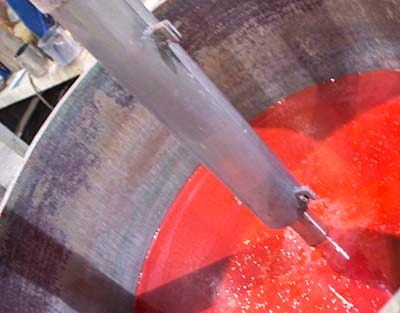4 Ways Manufacturers can Positively Impact Their Bottom-Line with Industrial Coatings
Manufacturers continually deal with the same everyday issues in the plant. While working to produce a certain number of products per hour on each assembly line, technical directors and operations managers hold responsibilities like maintaining high quality, minimizing failure rates, minimizing defects, and finding ways to keep their processes completed effectively and quickly.
Let’s take a look at four ways manufacturers can leverage industrial coatings to their advantage, if they are not already doing so:
1. Toll Blending Projects
Sometimes a manufacturer has the need to use another’s materials, methods and expertise by outsourcing their projects. We are a tolling partner to many manufacturers and work with them to provide expertise or equipment to fulfill their requirements and the needs of their customers.
For example, for a situation where a company wants to disperse a blend of pigments into a liquid carrier and sell into a totally unrelated industry and application, we would use equipment at our facility to produce their desired outcome. Another toll blending project involves changing the properties or concentrated raw material with another material or process to meet the specs of a customer. When products cannot tolerate the pure material, it needs to be transformed into a material that combines well with all aspects of that product.
End Use of Toll Blending Projects:
- Additives and enhancements
- Cleaning materials
- Concentrated or reduced materials
In the past, manufacturers have typically outsourced toll blending projects elsewhere, not knowing that industrial coatings manufacturers can take on this work or not knowing what the capabilities and equipment of a coatings manufacturer can do for unrelated industries.
2. Toll Paint
Industrial Coating manufacturers often look for others to produce product on their behalf. These types of customers own the intellectual property of the coating formulation, but do not have the capacity or resources to produce it with their busy production schedules.
3. Coating Projects
Coating projects usually include modifications to existing formulations that do not change the platform or core chemistry. A few examples:
- A slight change of color
- The increase or decrease of gloss
- Slight change in solvent combinations
- Property alterations by the addition of functional additives or procedures
For example, manufacturers often find the opportunity for additional products to compliment the products they are making and selling to increase their profit margins and market share within an industry, application or market space. Sometimes, they decide to make the same products as their competitors, but in a variety of different colors. Industrial coating manufacturers can take a base formulation for a platform with the same coating technology and use it for another company, industry, application or market.
4. Coating Formulations
If a manufacturer comes to us and asks for a product that we lack the knowledge to create and they don’t have a formulation for us to start with, we begin a research project. The research project utilizes our resources and produces a custom coating that fits the product line properly and specifications perfectly.
Why go out and search for a coating to somewhat match your specs, when your coating can be designed to match your product’s needs exactly? Ponder that.

Do you use standardized coatings or custom formulations? Provide your thoughts in the comments below!


